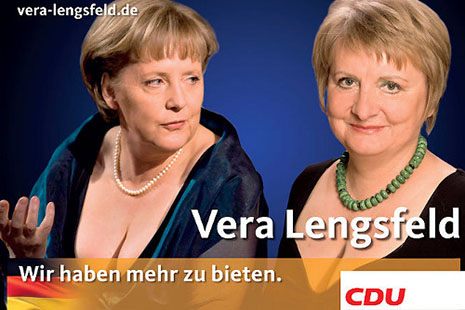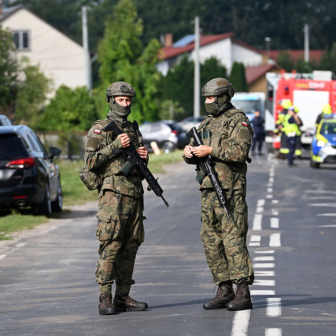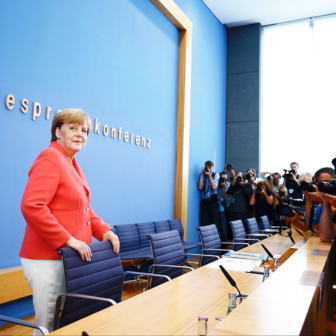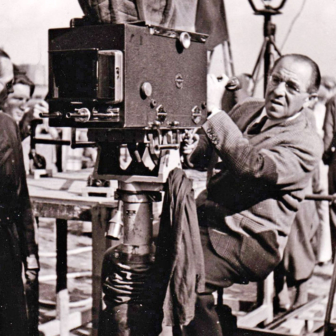POLITICAL JOURNALISTS look forward to a national election campaign at least as much as sports journalists anticipate football’s world cup. But imagine a world cup that wasn’t marked by fierce rivalry – a contest in which all matches seemed like draws, irrespective of the actual result, and the outcome of the final mightn’t matter. Rather than analysing the teams’ strengths and weaknesses and recounting goals and displays of individual brilliance, sports journalists would be forced to ponder why the tournament was a non-event. In sheer desperation, they might try to cajole their country’s coach and players into showing some passion.
On 27 September, sixty-five million Germans will go to the polls to elect a new Bundestag, the lower house of the federal parliament. The incoming government will face the challenge of steering the country out of the global financial crisis. It will need to respond to climate change. It must decide what to do with Germany’s ageing (and ailing) nuclear power stations, and the waste they generate. And it will have to deal with the problem of Germany’s extremely lop-sided economy: nineteen years after reunification, unemployment rates in the eastern states are still far higher than those in the old, pre-1990 Federal Republic.
But less than three weeks before the election, Angela Merkel’s Christian Democrats and their main rivals, the Social Democrats, aren’t engaged in a lively debate about how to address any of these challenges. So the journalists covering the campaign have resorted to reflecting on the prevailing sense of ennui, on the lack of controversial issues and on the inability or unwillingness of Germany’s politicians to enthuse the electorate. And in sheer desperation they have tried to persuade the country’s politicians to emulate the passion that marked the 2008 election campaign in the United States.
This sense of ennui is all the more surprising given that for the first time in the history of the Federal Republic the election is not essentially a two-horse race. Between them, the Christian Democrats (that is, the Christian Democratic Union and its sister party, the Christian Social Union, which fields candidates only in Bavaria) and the Social Democrats are unlikely to win more than 60 per cent of the vote. Only once before, in 1949, have the two parties attracted less than two thirds of the vote between them; for a long time, their combined vote was well over 80 per cent. In only four out of sixteen federal elections has a minor party received more than 10 per cent of the vote; this time, three minor parties, the Liberals, the Greens, and the Left, are each poised to perform well above that level. Yet boredom reigns supreme, as if the menus on offer were not only tasteless but also barely distinguishable – as if, in 1990, ten West German states had joined the German Democratic Republic, where the Socialist Unity Party used to “compete” with four so-called Blockparteien, parties which ostensibly offered the voter a choice but promoted exactly the same policies as the communists.
LATE LAST MONTH, the Social Democratic Party released a series of four election posters that now adorn billboards across the country. All of them feature the party’s contender for the German chancellorship (and only likely alternative to Angela Merkel), Frank-Walter Steinmeier. On one of them he is sitting in a beer garden in the company of three elderly women. The women are nursing glasses of beer. One of them, her face obscured, is talking, and Steinmeier, in a pin-striped jacket but not wearing a tie, is listening. The text reads: “That keeps Germany together: social security for all ages. Our country is capable of more.”
The poster says much about the current campaign. Steinmeier looks as if he is bemused by an anecdote about a grandchild rather than listening to concerns about climate change, the war in Afghanistan or the global financial crisis. Apparently Germany’s politicians don’t mind giving the impression they’re more interested in light-hearted banter than in serious debate. While the slogan proclaims that Germans could do more, the body language suggests that Germans are comfortable about the way things are.
That slogan “social security for all ages” – Soziale Sicherheit für alle Generationen – also looks like it might have been lifted from a 2007 party platform, “Freedom and Security: Principles for Germany.” Like most “principles” offered by political parties, this one is sufficiently vague; the only unusual aspect is its possible provenance. The 2007 platform in which the slogan Soziale Sicherheit für alle Generationen appeared prominently was that of the Christian Democratic Party.
The German election campaign lacks passion not least because little distinguishes the major political parties from each other. The Christian Democrats are currently in a grand coalition with the Social Democrats. While the coalition partners have had some disagreements, particularly in the past twelve months, they’ve worked together well enough to see out a full term in office. There are now no major political issues on which their policies are diametrically opposed.
Publicly, however, both Christian Democrats and Social Democrats are dissatisfied with the current arrangements, and both parties have said they want to govern without their current partner. Boosted by their success as senior partner in the Merkel government, the Christian Democrats are committed to forming a coalition with the Liberals. As the junior partner, meanwhile, the Social Democrats have lost support. Their vote is likely to drop from 34 per cent in 2005 (the party’s second-worst result since 1957) to around 25 per cent (which would be by far its worst ever result), so they have good reason to be wary of a continuation of the status quo. But they haven’t offered a clear alternative: when asked which outcome they are fighting for in the campaign, they say that they want to prevent a government of black (Christian Democrat) and yellow (Liberal).
The Liberals, who won 9.8 per cent of the vote in 2005, are the largest of the three opposition parties in the Bundestag. Espousing neoliberal economic policies, they are at one end of the spectrum represented in federal parliament. The Left – an amalgamation of the reformed communists (the Party of Democratic Socialism) in the East and renegade Social Democrats in the West – are at the other end, and won 8.7 per cent of the vote last time round. The Greens, attracting 8.1 per cent of the vote in 2005, are the smallest opposition party; between 1998 and 2005, they were the junior partner in a government led by the Social Democrats’ Gerhard Schröder.
In the absence of a debate about policies, the election campaign has focused on potential political alliances after 27 September. According to opinion polls, the Christian Democrats (who are currently predicted to poll about 35 per cent) and Liberals (14 per cent) will most likely be in a position to form government. The Social Democrats are running at 23 per cent, with their favoured coalition partner, the Greens, on 12 per cent. As Steinmeier has ruled out a coalition with the Left, he is in a quandary. In order to be in government, he would have to convince the Liberals to be part of a three-party coalition that also included the Greens: the so-called Ampel – traffic light – model: red, yellow and green. Or his party would have to continue as junior partner in a grand coalition with the Christian Democrats.
In spite of what the pollsters say, the next German government might not be formed by Christian Democrats and Liberals. As happened in 2005, there could be a last-minute surge in support for the Social Democrats, and the black-yellow combination could miss out on a clear majority. In two of three state elections held on 31 August, in Saarland and Thuringia, the Christian Democrats lost heavily. But voters did not flock to the Social Democrats instead. And in the third recent election, in Saxony, the Social Democrats got barely more than 10 per cent of the vote and narrowly missed out on being only the fourth-largest party in state parliament (after the Christian Democrats, the Left and the Liberals). The German newspaper Tageszeitung is probably correct in saying that, recent electoral upsets notwithstanding, the only way Angela Merkel could fail to be re-elected would be “if she were filmed robbing a supermarket.”
In the case of a better than expected outcome for the Social Democrats (or heavy losses for the Christian Democrats), two potential scenarios are the most likely. Current arrangements could continue, or a coalition could form between Christian Democrats, Liberals and Greens – the so-called Jamaica model (after the colours of the Jamaican flag: black, yellow and green). But if the opinion polls turn out to be accurate, a black–yellow coalition is not a foregone conclusion; the Christian Democrats seem to have more in common with the Social Democrats, or even with the Greens, than with the Liberals, particularly when it comes to economic and environmental issues. Tellingly, the most acrimonious exchanges in the campaign to date were those between politicians of the Bavarian Christian Democrats – the Christian Social Union – and the Liberals.
THE FACT that at least four different constellations are conceivable – black–red, black–yellow, black–green, and red–yellow–green – is indicative of the eagerness of both Greens and Liberals to be part of a governing coalition. But it is also evidence of the fact that, in terms of their policies, little distinguishes the major parties. In the pre-1990 Federal Republic there were two main political camps in parliament: the left-wing Social Democrats (who were aligned with the unions, and had their strongholds in the cities – particularly in Germany’s old industrial heartland, the Ruhr Valley in North-Rhine Westfalia – and in the protestant states in northern and central Germany) and the right-wing Christian Democrats, whose strongholds were in the Catholic south and in rural Germany. From the late 1940s until the late 1960s, and again since the early 1980s, the Liberals were more or less affiliated with the Christian Democratic camp. Between 1969 and 1982, they were the junior partner in a government led by the Social Democrats, first under Willy Brandt and then under Helmut Schmidt.
Under Schmidt (chancellor from 1974 to 1982) and Schröder (chancellor from 1998 to 2005), the Social Democrats have arguably moved to the right. More importantly, however, the Christian Democrats have made major inroads in states traditionally governed by the Social Democrats (including in North-Rhine Westfalia, which, since 2005, has had a Christian Democrat state premier), and in the past few years have shed their image as a conservative party aligned with the Catholic Church. In Angela Merkel, Germany has not only had its first woman leader, and the first chancellor with an East German upbringing (although she, too, was born in West Germany), but also its first Protestant Christian Democratic chancellor.
While the two major parties occupy the centre, the three minor parties cannot be easily located on a left–right continuum either. The Liberals seem to be the most likely contender for a right-wing party. Their clientele, the educated middle class and small business people, expect them to lower taxes and cut welfare payments. But they are not social conservatives – and not only because their leader, Guido Westerwelle, is openly gay. They are also championing civil liberties, and have vowed to rewrite Germany’s anti-terrorism laws. The Greens no longer stand for policies traditionally associated with the left, and now have much in common with the Christian Democrats. Early last year, the two parties struck an agreement to form the government in the city-state of Hamburg; many Greens and Christian Democrats now cite that experience as one to be emulated elsewhere. That leaves the Left. Many of its representatives are social conservatives, and on that account alone, the party could not be placed easily to the left of the other parties.
The Left also seems to attract voters who otherwise would flock to the far right. Merkel’s is only the second government in the history of the Federal Republic formed by a coalition of the two major parties. The first grand coalition lasted for three years, from 1966 to 1969. It spawned a sizeable non-parliamentary opposition and very nearly alienated enough voters for the far-right National Democratic Party to get beyond the five per cent threshold required to enter parliament.
Given that precedent, it might seem surprising that the far right is not a major player this time around. The marginalisation of the far right is also significant in light of the last federal elections in Austria. Like Germany, Austria has been governed by a grand coalition of Social Democrats and the Austrian equivalent of the Christian Democrats, the Austrian People’s Party. In the 2008 elections, two parties that are clearly to the right of the People’s Party together won more than 28 per cent of the vote. Both of them promote immigration and refugee policies that are arguably racist. In the German election, though, race has so far not been an issue. Last month, the state premier of North-Rhine Westfalia, the Christian Democrat Jürgen Rüttgers, commented on the relocation of a Nokia plant to Romania by saying that Romanian workers “don’t come at seven in the morning like they do here in North Rhine-Westphalia, and they don’t stay until the factory closes” but “come and go when it pleases them.” His remarks were loudly condemned, and he had to apologise.
There is yet another reason why the current election campaign arouses few passions. With one exception, the major politicians are themselves perceived to be boring. That matters in a country where election rallies, attended by thousands of people, are still an important ingredient of an election campaign. With one exception, there is no politician who inspires and antagonises voters as much as the legendary Franz-Josef Strauss or Willy Brandt did. Angela Merkel is well-liked and has an approval rating most politicians can only dream of. But she has no charisma, and does not seem to stand for any particular political program. Her main rival, Frank-Walter Steinmeier, is the kind of guy old ladies invite to sit with them in the beer garden. As Gerhard Schröder’s long-serving chief of staff, he has the reputation of being an efficient bureaucrat. He is respected as Germany’s foreign minister. But never having been a member of parliament, he is not an experienced campaigner.
The only prominent politician with charisma, in spades, is Oskar Lafontaine, one of the leaders of the Left. He was the Social Democrats’ candidate in the 1990 federal elections, which they lost largely on account of Lafontaine’s reservations about the process of reunification. He subsequently became chairman of the Social Democratic Party but opened the way for Schröder to run against the incumbent chancellor, Helmut Kohl. After serving for six months under Schröder as finance minister Lafontaine had a falling-out first with his boss, and then with the rest of his party. He, too, has no discernible political program. Where his agenda is not shaped by populist considerations, it seems informed by his desire to punish his former comrades for being once loyal to his arch enemy, Gerhard Schröder.
Germany’s political journalists are despondent. So far there has barely been a stoush worth reporting. Trying to find an angle worth reporting, journalists are talking up outsiders like the Pirate Party. But the electorate doesn’t seem to mind. “Angie” Merkel is liked partly because she promotes harmony: between East and West, the former left and the former right. Steinmeier and his party find it difficult to portray themselves as a viable alternative because, in the interest of harmony, Merkel has become the unions’ best friend and has championed social democratic policies. Unlike in 1969, after Germany’s previous experiment with a grand coalition, the majority of the electorate, I suspect, wouldn’t mind a continuation of the Merkel government. Maybe the electorate would opt for one that also includes the Liberals and the Greens, if that were possible.
But Germany’s voters will probably have little say in who forms government: black–red, black–green, black–yellow, Ampel or Jamaica. Only a vote for the Left seems to deliver a certain outcome, because so far none of the other parties seem to be prepared to involve the Left in forming government. But even that may change: in several states, the Left has already governed in coalition with the Social Democrats, who at the federal level are not opposed so much to the Left’s policies as to the renegade Social Democrat, Oskar Lafontaine. Given that the outcome of the popular vote will merely be one of the factors deciding the composition of the government, only one election result seems certain at this stage: the number of those who do not vote or who vote informally will be at a record high.
The prospect that more than ten million German voters may abstain is testament both to the lacklustre campaign and to their level of comfort. The image of Steinmeier and the three old ladies does strike a chord. Yes, there is a global financial crisis, but Germans seem to think they have weathered the storm. Yes, climate change is a serious problem, but unlike in countries like Australia there is broad agreement that the government needs to act decisively even if such actions temporarily inconvenience people. The only major issue of concern that featured in the campaign is Germany’s involvement in Afghanistan, particularly after a German officer last week called in an American air strike that resulted in heavy civilian casualties. But Afghanistan is a long way from home. According to an opinion poll, only 12 per cent of voters think that the elections will shape Germany’s future. Ahead of the 2005 elections, 47 per cent of polled voters responded “yes” to the same question.
Perhaps of more concern than the ennui that characterises the election campaign is the lacklustre performance of the German football team (which just beat minnow Azerbaijan four–nil). If the squad’s current performance were to translate into a poor showing in South Africa, that would be a real concern. In that case not even Angela Merkel would be able to smooth things over. •




